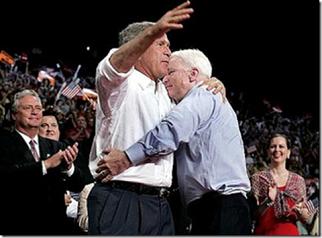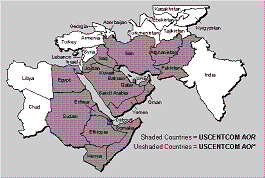Admiral Fallon Out at CENTCOM, Pushed Diplomacy
Cross-posted from The Paragraph
Tehran’s feeling pretty cocky right now because they’ve been able to inflict pain on us in Iraq and Afghanistan. [The trick is] to try to figure out what it is they really want and then, maybe—not that we’re going to play Santa Claus here or the Good Humor Man—but the fact is that everyone needs something in this world, and so most countries that are functional and are contributing to the world have found a way to trade off their strengths for other strengths to help them out. These guys are trying to go it alone in this respect, and it’s a bad gene pool right now. It’s not one with much longevity. So they play that card pretty regularly, and at some point you just kind of run out of games, it seems to me. You’ve got to play a real card.x80
~~~
It is my belief that today, there is far too much talk of war and not enough talk about moving things forward in this region and taking care of the many needs of the people …x81
This constant drumbeat of conflict is one that strikes me as not helpful, not useful for the people, and I wish we could get moving to things that are more constructive for the region.
...
[I]t is certainly my hope and expectation that there is no war and that is what we ought to be working for. We ought to find ways in which we can get countries to sit together for the benefit of everyone involved. So whether now or in the future, war is not a good idea.

Adm. Fallon – pushes diplomacy (U.S. Navy)

Bush & McCain – push wider war
Sources
80 ‘The Man Between War and Peace’ – By Thomas P.M. Barnett, Esquire, March 2008
81 ‘Far too much talk of war’ – Al Jazeera
... Fallon almost certainly knew that he would be fired when he agreed to cooperate with the Esquire magazine profile in late 2006.
...
The resignation brings to an end a year, during which time Fallon clashed with the White House over policy toward Iran and with Gen. David Petraeus and the White House over whether Iraq should continue to be given priority over Afghanistan and Pakistan in U.S. policy.
Fallon’s greatest concern appears to have been preventing war with Iran. He was one a group of senior military officers, apparently including most of the Joint Chiefs of Staff, who were alarmed in late 2006 and early 2007 by indications that Bush and Vice-President Dick Cheney were contemplating a possible attack on Iran.
...
Col. W. Patrick Lang, a former intelligence officer on the Middle East for the Defence Intelligence Agency, told the Washington Post last week that Fallon had said privately at the time of his confirmation that an attack on Iran “isn’t going to happen on my watch”, When asked how he could avoid such a conflict, Fallon reportedly responded, “I have options, you know.” Lang said he interpreted that comment as implying Fallon would step down rather than follow orders to carry out such an attack.
As IPS reported last May, Fallon was also quoted as saying privately at that time, “There are several of us trying to put the crazies back in the box”. That was an apparent reference to the opposition by the Joint Chiefs of Staff to an aggressive war against Iran.
Even before assuming his new post at CENTCOM, Fallon expressed strong opposition in mid-February to a proposal for sending a third U.S. aircraft carrier to the Persian Gulf, to overlap with two other carriers, according to knowledgeable sources. The addition of a third carrier was to part of a broader strategy then being discussed at the Pentagon to intimidate Iran by making a series of military moves suggesting preparations for a military strike.
The plan for a third carrier task force in the Gulf was dropped after Fallon made his views known.
Fallon reportedly made his opposition to a strike against Iran known to the White House early on in his tenure, and his role as CENTCOM commander would have made it very difficult for the Bush administration to carry out a strike against Iran, because he controlled all ground, air and naval military access to the region.
But Fallon’s role in regional diplomacy proved to be an even greater source of friction with the White House than his position on military policy toward Iran. Personal relations with military and political leaders in the Middle East had already become nearly as important as military planning under Fallon’s predecessors at CENTCOM.
Fallon clearly relished his diplomatic role and did not hesitate to express views on diplomacy that were at odds with those of the administration. Last summer, as Dick Cheney was maneuvering within the administration to shift U.S. policy toward an attack on bases in Iran allegedly connected to anti-U.S. Shiite forces in Iraq, Fallon declared in an interview, “We have to figure out a way to come to an arrangement” with Iran.
84 ‘Iraq Study Group Report: Executive Summary’ 6 December 2006
Our most important recommendations call for new and enhanced diplomatic and political efforts in Iraq and the region, and a change in the primary mission of U.S. forces in Iraq that will enable the United States to begin to move its combat forces out of Iraq responsibly. We believe that these two recommendations are equally important and reinforce one another.
The United States should immediately launch a new diplomatic offensive to build an international consensus for stability in Iraq and the region. This diplomatic effort should include every country that has an interest in avoiding a chaotic Iraq, including all of Iraq’s neighbors. Iraq’s neighbors and key states in and outside the region should form a support group to reinforce security and national reconciliation within Iraq, neither of which Iraq can achieve on its own.
Given the ability of Iran and Syria to influence events within Iraq and their interest in avoiding chaos in Iraq, the United States should try to engage them constructively. ...
85 ‘Cheney’s Iran Fantasy’ by Joe Klein, Time, May 25, 2007
Last December, as Rumsfeld was leaving, President Bush met with the Joint Chiefs of Staff in “The Tank,” the secure room in the Pentagon where the Joint Chiefs discuss classified matters of national security. Bush asked the Chiefs about the wisdom of a troop “surge” in Iraq. They were unanimously opposed. Then Bush asked about the possibility of a successful attack on Iran’s nuclear capability. He was told that the U.S. could launch a devastating air attack on Iran’s government and military, wiping out the Iranian air force, the command and control structure and some of the more obvious nuclear facilities. But the Chiefs were—once again—unanimously opposed to taking that course of action.
86 Gen. Petraeus’ Testimony to the Senate Armed Services Comm. – 2008-04-08
Iraqi lawmakers traveled to the Iranian holy city of Qom over the weekend to win the support of the commander of Iran’s Qods brigades in persuading Shiite cleric Muqtada al Sadr to order his followers to stop military operations, members of the Iraqi parliament said.
Sadr ordered the halt on Sunday, and his Mahdi Army militia heeded the order in Baghdad, where the Iraqi government announced it would lift a 24-hour curfew starting early Monday in most parts of the capital.
But fighting continued in the oil hub of Basra, where a six-day-old government offensive against Shiite militias has had only limited gains.
So far, 488 people have been killed and more than 900 wounded in the offensive, Iraqi Interior Ministry officials said.
88 ‘President Bush Discusses Iraq’ 2008-04-10
The regime in Tehran also has a choice to make. It can live in peace with its neighbor, enjoy strong economic and cultural and religious ties. Or it can continue to arm and train and fund illegal militant groups, which are terrorizing the Iraqi people and turning them against Iran. If Iran makes the right choice, America will encourage a peaceful relationship between Iran and Iraq. If Iran makes the wrong choice, America will act to protect our interests, and our troops, and our Iraqi partners.
89 ’ Remarks By John McCain To The Members Of The Veterans Of Foreign Wars (VFW)’ April 7, 2008 “We must press ahead against … the Iranian-backed Special Groups …”
90 ‘When Did Iran Start Beating Its Wife Again?’ by Jeff Huber, ePluribus Media, 04/28/2008
“Shipments of arms” continue to flow from Iran to Iraq, according to the article. Iran seems to be focusing now on “training Iraqi Shiite fighters inside Iran.” The Iranians provide “weapons to militias fighting the Shiite-led government in Baghdad as well as to militias supporting that government.” “American commanders” now have “a clearer picture of how Iranian weapons have entered Iraq.” “Iran’s Quds Force” has developed “a formal and sophisticated training program.”
By what burden of proof did these condemning allegations earn their way into America’s newspaper of record? Why, by the brave new world order’s highest standard of bedrock evidence: the testimony of anonymous “officials.”
91 ‘Will Bushies Sell Iran War ‘Product’?’ – The Paragraph, 2007-09-08
The British return to Basra comes days after the Government announced that Gordon Brown’s pledge to reduce troop levels by 1,500 this spring could not be fulfilled because of security concerns. The development comes alongside the disclosure that up to 1,500 Iraqi soldiers refused to fight, or deserted in the operation against the radical cleric Moqtada al-Sadr’s Shia militia. The numbers, according to Iraqi and American sources, included dozens of officers and at least two senior field commanders. ...
In addition to those who refused to follow orders, about 100 members of the Iraqi security forces simply changed sides, to the Mehdi Army. The Iraqi Prime Minister, Nouri al-Maliki, has faced strong criticism over the operation, which he had led after flying from Baghdad to Basra and which ended, critics say, in a stalemate with an Iranian-brokered peace deal.
...
... The offensive which took place concentrated … on Mr al-Sadr’s forces while the Badr Brigade, which has links to Mr Maliki’s government, and the Fadilla group of Basra governor Mohammed Waeli were not targeted.
* * *
By Quinn Hungeski – Posted at G.N.N. & TheParagraph.com










